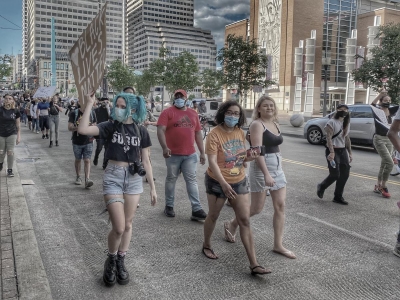Navigating Cross-Racial Conversations in a Time of Civil Unrest

Everyone Is Talking About Race Right Now. But How And For How Long? By Stacia Brown & Anta Rao, June 11, 2020, Embodied Series, WUNC, The State of Things
Sarah Gaither, Assistant Professor of Psychology and Neuroscience at Duke, discusses interracial conversations about race and racism with NPR host Anita Rao.
Listen here (35:27)
Nationwide protests against the police killing of George Floyd are still underway, and they have reignited discourse around race and racism. These conversations can be particularly challenging for friends, partners, and colleagues of different races.
Interracial couples may be approaching conversations about racism from difficult angles than usual in this moment -- or engaging the topic directly for the very first time. White friends are struggling with how to approach their black friends during this time, and black friends are finding it challenging to field an influx of “check-ins” from friends and colleagues who’ve rarely talked to them about race or racism before. On this week’s “Embodied,” host Anita Rao will talk to Sarah E. Gaither, assistant professor of psychology and neuroscience at Duke University, Rain Bennett, filmmaker and host of The Storytelling Lab podcast, Priska Neely, reporter/producer for the podcast and website Reveal, and Candace Manriquez Wrenn, director and producer for NPR’s Marketplace about navigating cross-racial conversations in a time of civil unrest.
\Candace Manriquez Wrenn is a black woman married to a “white-presenting” man (he’s part-Japanese, but perceived by most as white). It is the second marriage for both of them, and both have children from previous relationships. “I live in race. I mean, I’m a black woman…. From the very beginning, we talked about race on a daily basis.” Manriquez Wrenn says. “I have children from a previous marriage. My husband was going to have to take on black children if he wanted to be with me.”
But even in a partnership where conversations about race are frequent and nuanced, the death of George Floyd and subsequent protests and ongoing discourse around them have been taxing for Manriquez Wrenn. “Just recently, in the past couple of weeks, I’ve had a couple of breakdowns, where I’ve just really lost it. I have a black son, and I just really lost it. It’s hard for anyone to empathize with that who can’t 100 percent [relate]. I will say I am lucky in that I am married to someone who really, really tries.”
Rain Bennett, who is married to a black woman, agrees. “Daily, I see the struggle she’s going through. As a partner, I just try to be there for her as much as I can. […] We are constantly having to talk about this, because as a white man. […] I always have something to learn.” He says that this protest moment has provided him some optimism. “It’s not easy for a white person to talk about these things — and this is the challenge that has been presented historically. Those that may want to speak out or to stand up, at the first sign of any kind of struggle or obstacle, which there’s obviously going to be, they tend to fall. I feel like for once I’m finally seeing that tide shift … and while my wife can watch that cautiously, because she’s probably seen that before, it leaves me with hope.”
Manriquez Wrenn and Bennett’s marriages are just two of a growing national demographic. “We’re actually seeing interracial marriages at an all-time high,” says Professor Sarah E. Gaither. “We’re seeing one of the most common cross-race marriage patterns in the country. At the same time, we’re still not seeing 100 percent acceptance of these partnerships. [...] Particularly cross-race partnerships between white and black individuals are still viewed negatively.”
Gaither says that her advice to white people newly engaging in discourse around race and racism is to expect any change to be incremental. “Start small. Don’t just jump into very difficult racial and ethnic conversations. I would encourage you to listen first. Read Black Twitter. Look at social media stories. Watch your local news, and do a diversity search of the people who are interviewed. [...] Allow yourself time to actually process this new information. It is a lot to think about, particularly for white and high-status individuals who have not been forced to think about race and racism.”
Priska Neely has written about a recent influx of concern she’s received from white colleagues and friends following the death of George Floyd. “It felt like people were responding to the social media language of, ‘Check in on your black friends. Check in on people of color this week.’ It sometimes didn’t feel super genuine, even if it was well-intentioned.”
Gaither suggests that white friends try to consider how some of their black friends and colleagues might feel in this moment. “I don’t think white individuals in particular realize how tired members of the black community are speaking of these things on a daily basis,” she notes. “This is something that black people face every day and no one has checked on them before.”
She suggests taking a few preliminary steps before reaching out. “Spend a little time on the internet Googling other things you can do.” She adds, “You don’t necessarily need to ask a black friend why it is that we’re having these protests right now.”




